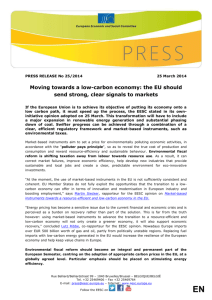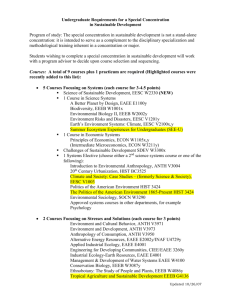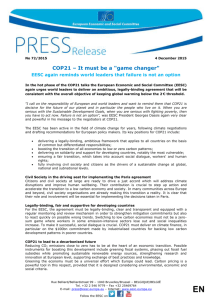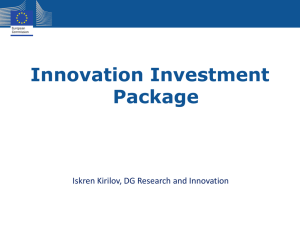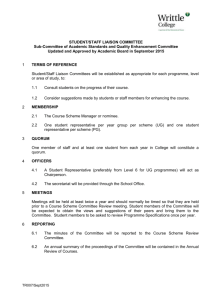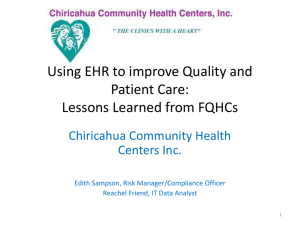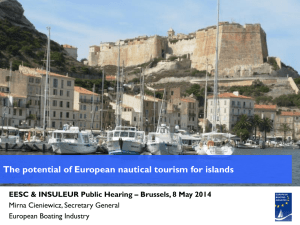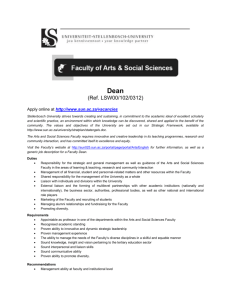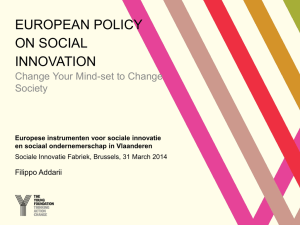Record of proceedings of the 27th meeting of the Liaison Group of
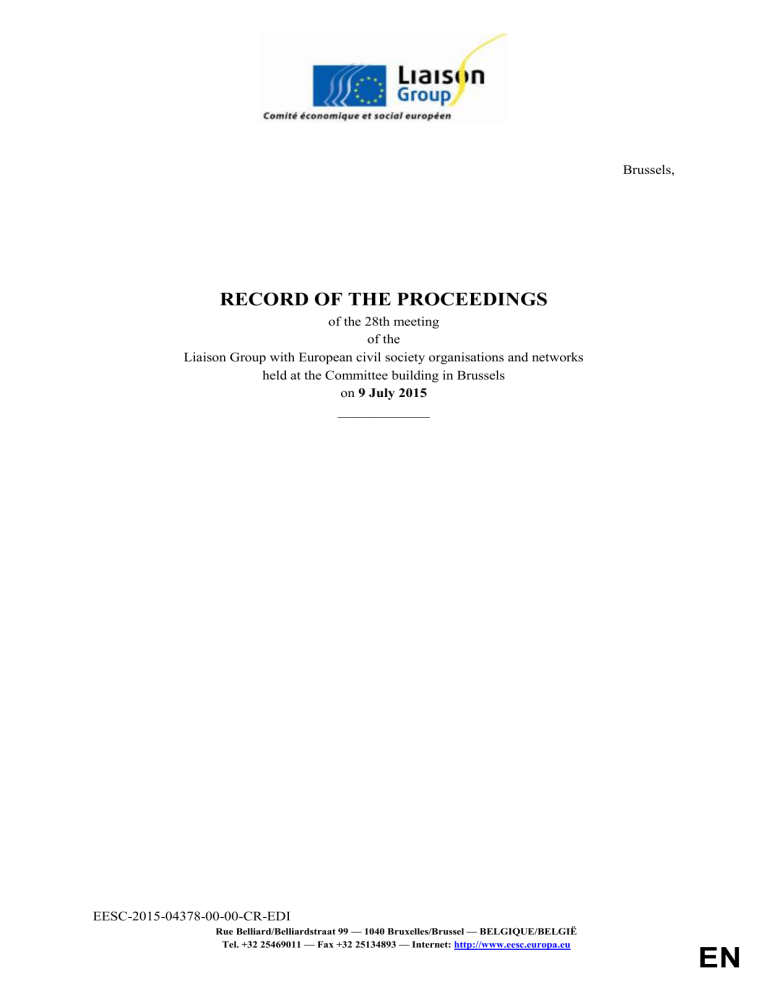
RECORD OF THE PROCEEDINGS
of the 28th meeting of the
Liaison Group with European civil society organisations and networks held at the Committee building in Brussels on 9 July 2015
_____________
Brussels,
EESC-2015-04378-00-00-CR-EDI
Rue Belliard/Belliardstraat 99 — 1040 Bruxelles/Brussel — BELGIQUE/BELGIË
Tel. +32 25469011 — Fax +32 25134893 — Internet: http://www.eesc.europa.eu
EN
The Liaison Group with European civil society organisations and networks held its 28th meeting in
Brussels on 9 July 2015 , under the joint chairmanship of Henri Malosse , President of the EESC, and
Conny Reuter , Secretary-General of SOLIDAR. The meeting commenced at 10.15 a.m.
and finished at approximately 12 noon .
ATTENDANCE LIST (See Appendix)
*
* *
Mr Malosse welcomed the Liaison Group participants.
1.
Adoption of the draft agenda
The draft agenda was adopted.
2.
Approval of the minutes of the 27th meeting
The minutes were approved.
3.
Statements by the EESC president, Mr Malosse, and the Liaison Group co-chair, Mr
Reuter
Mr Malosse opened the meeting with comments on the current crisis in Greece in general and his visit to the European Parliament (EP) earlier that week, where he had followed the speech of, and debate with, Greek Prime Minister Alexis Tsipras. He particularly regretted the divisions in Europe between governments, Member States and Europeans. He reported on his contacts with Greek members of the European Parliament and on the social, economic and humanitarian crisis in Greece.
Furthermore, he informed the Liaison Group members about the recent visit of Commission First
Vice-President Frans Timmermans to the EESC Bureau and the discussion on the Better Regulation package. The EESC Bureau had conveyed its support for better and simpler legislation to the
Commission Vice-President. He recalled the institutional role of the Committee as an advisory body that should be used rather than creating ever more additional bodies and committees with memberships of questionable representativeness. The EESC was ready to examine the impact of legislation, as it already did with its Single Market Observatory, created expressly to screen and advise on legislation and its enactment in the Member States.
Mr Reuter thanked Mr Malosse for his statement and for the analysis of the current situation in
Greece. He thanked the president for his support for reviving the Liaison Group over the previous two years. European civil society needed to come to an agreement on the great challenges ahead, and to try to participate in the battle.
EESC-2015-04378-00-00-CR-EDI
4.
Debate on the current political situation in Greece and Europe
Mr Reuter called the debate on Greece in the European Parliament a sad spectacle for convinced
Europeans. Civil society needed to re-appropriate the European project. He drew a comparison to
1914 and deplored the level of the European debate in Germany that consisted of pointing fingers and teaching lessons. He expressed concern that a new fear of Germany would feed into political processes.
Georgios Dassis , President of the EESC's Workers' Group, thanked the two co-chairs for their comments. He called upon politicians to stop lying; so far no money had been lost in Greece. He warned of the dismantling of the European Union. The EESC and its partners in the Liaison Group and beyond needed to take action. He expressed his conviction of the need to continue the European integration project.
Jacek Krawczyk , President of the EESC's Employers' Group, expressed his hope that the crisis would end with only minimum damage; at that point all one could hope for was limited damage, rather than talking about "success". To him, the debate in the EP had not been one-dimensional, but had contained viable questions that had to be asked, such as whether the EU was governed by the same principles, applicable to all Member States, or not. He expressed his worries about the strong statements made by some Member States. However, massive financial commitments had been made by some Member States such as Germany and others. He warned of the risk of dividing Member
States into categories of "good and bad" or "right and wrong".
Luca Jahier , President of the EESC's Various Interests Group, saw the debate in the EP as rather positive. The EP as a genuine political forum was the right place to debate a genuine crisis; it was unfortunate that it had not held the debate three months earlier. According to him, Europe had taken a step forward, and the debate was a positive factor.
Europe should concentrate on the specific problems that needed to be fixed, rather than putting EMU as such into question. He identified a general divide in public opinion as well as a great deal of prejudice, which was regrettable. Five years had been lost without realising the prescribed recipe did not really work. He expressed his hope for a common sense solution, a good balance between the applicable rules and a political solution. Other problems on the global agenda also needed European attention, citing in particular the recent economic developments in China, the crisis with Russia and the advance of ISIS.
Carlos Trias Pintó
, President of the CCMI, considered the current state of the debate disappointing and lamentable. Responsibility for the current crisis was clearly shared between Greece and the troika.
However, criminalising countries did not provide a solution. Europe needed an honest analysis of the situation. The European project had a greater role to play as a model in the world. The EESC should have taken a clear position on the situation to salvage the dialogue and come up with a solution to allow the EU to continue its project.
EESC-2015-04378-00-00-CR-EDI
Luk Zelderloo regretted the ongoing negative blame game between Europeans. Politicians were responsible for public opinion. The Liaison Group should make a contribution, possibly in the form of a statement or adopted resolution, calling for the prejudice and over-simplification poisoning people's minds to be counteracted. The EESC and the Liaison Group should table a motion stating the risks involved in continuing this blame game and calling for a stop. National politicians, opinion leaders and the media should stop; otherwise they would contribute to the long-term erosion of the European project. He asked the co-chair Mr Reuter to table a motion on short notice.
Reacting to the analogy of the EMU's flat tyre, Patrice Collignon asked whether the road (i.e. EMU) was properly maintained, and whether the road actually led in the right direction. Those were the bigger questions Europe had to answer, beyond the strictly financial questions.
Mr Reuter congratulated the Liaison Group for having such a political debate on current concerns.
He shared the concern regarding the poisoning of public opinion and the media not doing its job properly. Concerning the idea of a joint statement, which he supported, he called upon the members of the Liaison Group to disseminate such a statement and to bring the debate out of the "Brussels bubble" and into the Member States and their associations. He mentioned the recent stance taken by
Caritas Europe on the situation in Greece that was laudable and was being heard in Europe.
On the procedure, and indicating that there was no session of the EESC at which any declaration could be adopted before September, and considering that EESC president Henri Malosse had left the meeting, he asked the present EESC group presidents for their opinion and support for such a declaration on Greece.
The three group presidents, Mr Krawczyk , Mr Dassis and Mr Jahier all declared their support for a declaration that could be issued jointly by the EESC president and the Liaison Group.
Mr Zelderloo pledged to draft a proposal that would be circulated at the end of the day, for agreement by written procedure.
[The resulting statement was issued by the EESC president and can be consulted here: http://www.eesc.europa.eu/?i=president.en.my-news.36426
]
5.
Discussion on future developments in connection with the Better Regulation package and the Interinstitutional Agreement that had been announced
Referring to the contribution of Marianne Klingbeil, Deputy Secretary-General of the European
Commission, during Civil Society Day, Mr Reuter identified a communication problem on Better
Regulation. A major misunderstanding persisted within the European Commission (EC) concerning civil dialogue. The EC thought that civil society was a channel of transmission for Commission policies. Instead, it should be considered as an interlocutor. Dialogue did not consist of one-way communication from the EC to civil society organisations. He would – as part of Social Platform
EESC-2015-04378-00-00-CR-EDI
delegation - meet Commission First Vice-President Frans Timmermans later in the day and expressed his hope that he would listen to civil society concerns. What was needed was a true civil dialogue, which should happen in addition to social dialogue. Civil society competence needed to be recognised.
Mr Dassis reported on the recent EESC Bureau debate with Mr Timmermans. He pointed to a number of discrepancies in Commission statements, notably concerning the EC’s priorities (investment plan, social dialogue, etc.) and the Better Regulation package presented by Mr Timmermans. To him, the future direction of Europe remained unclear, notably if there would be continued harmonisation between Member States, if Member States were encouraged to go beyond minimum regulation at
European level or not, if deals struck by social partners in the framework of social dialogue would remain binding or not, etc.
He also regretted that only a small role was given to the two consultative Committees, especially within the newly created committee of independent experts, which would accompany the Better
Regulation package in the framework of the REFIT exercise. He called into question the composition and independence of this committee and questioned its role alongside established consultation procedures. The EC should provide clarifications on these questions, especially on the future role of social dialogue.
Mr Krawczyk did not agree with the evaluation that the EESC had not been properly consulted. Its success might vary, but the consultation procedure as such was sound. He pointed out that the EESC had created a subcommittee that would elaborate an opinion on the Better Regulation package during the summer. The subcommittee should deliver its opinion for the September plenary session; its work should be respected. It was hence too early for a final evaluation.
He regretted the limited role given to both the EESC and the CoR in the Better Regulation
Committee, where at least three members should participate. He called for the support of the Liaison
Group. According to him, Mr Timmermans liked to approach member organisations directly, not via the Committee, which did not fully respect its treaty role.
Taking a self-critical stance, Mr Jahier noted that the EESC had underestimated the scope of the
Better Regulation exercise and realised the potential problems behind it too late. Europe should create a minimum legislative framework. The EC communication was prepared without any consultation. He deplored the EC’s obvious attitude to go ahead anyway if a consultation did not agree with the EC’s proposals. According to him, this was not a functional dialogue. He enquired about the specific role of the newly created Better Regulation Committee, and warned of a multiplication of channels. Existing structures such as the consultative Committees should be used instead. He supported a more effective consultation of civil society. Art. 11 TEU had largely been abandoned even in areas where it worked well. He expressed his regret regarding this retreat on efficient consultations.
Mr Trias Pintó expressed his concern that Better Regulation could mean less legislation. It was important to maintain legislative consistency, which had not always been the case in the past, citing
EESC-2015-04378-00-00-CR-EDI
legislative fragmentation, inconsistencies, etc. as examples. He also regretted internal inconsistencies within the EC, such as different DGs pursuing different and contradictory policy goals, for example concerning the circular economy. Better regulation could not mean the elimination of necessary legislation; this needed to be looked at case by case. The EESC should be present to play an active role.
Mr Reuter clarified that he wondered about the effectiveness and impact of civil dialogue and the consultations taking place. The attitude of the Commission concerning the Better Regulation package showed that this Commission (in its own words the "most political Commission ever") consulted pro forma, but intended to go ahead anyway, even if the results of consultation might warrant policy changes. Concerning the Interinstitutional Agreement, he advocated for a continued balance between the Commission, the Council and the EP, as well as the EESC and CoR.
Mr Collignon highlighted the importance of impact assessments of consultation procedures by the
Commission, responding to the concerns of civil society organisations.
Mr Jahier clarified that the Commission did publish a follow-up on its consultations and EESC opinions.
Mr Collignon stressed that public consultations should receive the same follow-up as EESC opinions.
Mr Reuter recalled the many contributions of civil society to the Europe 2020 programme. The
Commission should respond to consultations. European civil society networks could contribute to such impact assessments, be they economic, social or political. These questions were also linked to representativeness and the legitimacy of contributions. He stressed the pivotal role of consensus in the
EESC, enhancing the quality of its opinions.
6.
Taking stock of the 2015 Civil Society Day
Mr Reuter briefly presented the outcome of the 2015 Civil Society Day, which had attracted some
200 participants. He also referred to the seminar organised by Group III shortly afterwards on similar topics. The Liaison Group needed to reflect on future format changes that would allow the conference to become more interactive. He highlighted the importance of social media when reaching out to the public, especially the success on Twitter. On the content side, the Liaison Group would need to check in one year's time what would be implemented from the Riga Roadmap. He asked the members of the
Liaison Group to express their ideas, especially with regard to the 2016 edition.
Mr Jahier pointed to the incoming EESC presidency that would surely give some input to the Civil
Society Day. He proposed the creation of a more substantial forum or "agora" on an annual or biannual basis, which could also involve civil society activities at national, regional and local level, similar to the CoR's Open Days. He underlined the budgetary implications of such an enlarged exercise, which might make it difficult to implement in 2016.
EESC-2015-04378-00-00-CR-EDI
Mr Dassis supported the idea of enlarging Civil Society Day to more than one day, but in full cooperation with civil society organisations. Specific proposals should be put forward by the NGOs represented in the Liaison Group.
Mr Collignon supported civil society ownership of Civil Society Day, which should not be an
"institutional" meeting. Support from civil society organisations at national, regional and local level needed to be forthcoming, as it was regional participation that made the CoR's Open Days such a success.
Mr Reuter indicated that he saw overall agreement for an overhaul of the format of Civil Society
Day, making it more interactive and participative, and going beyond the usual suspects in the
"Brussels bubble". He recalled the EP's former Agora initiatives that had managed to involve civil society organisations from the Member States, but which had unfortunately been discontinued. The
EESC should use its contacts with national ESCs in order to enlarge, diversify and Europeanise participation. The specific format and theme would of course also depend on the priorities of the new
EESC presidency.
7.
Report on the activities of the Liaison Group 2014-2015
Mr Reuter briefly summarised the activities of the Liaison Group in the past year, citing the organisation of the NGO Forum in Riga and the adoption of the Roadmap as well as the good collaboration with the Latvian Presidency as important steps forward. He also mentioned contributions to topics like the ECI, Industry 4.0, the circular economy, sustainability, entrepreneurship and the European Year of Development. He called upon the Liaison Group to contribute to setting the agenda at European level, and not only reacting to it.
Mr Jahier complimented Mr Reuter for the activity report and the steps forward the Liaison Group had taken.
Mr Dassis stressed that the collaboration between the EESC and the Liaison Group should be made as practical as possible, and that the members should be involved even more closely in the EESC's work.
8.
Any other business
Mr Reuter briefly outlined a few topics on the agenda for the coming months, notably the
Commission President's "State of the Union" address in September, the future collaboration with the incoming EESC presidency and the Liaison Group's commitment to put forward a work agenda for the coming months.
Mr Reuter concluded by thanking all those who had spoken for their contributions and suggestions and closed the meeting at 12:05 p.m.
EESC-2015-04378-00-00-CR-EDI
*
*
*
EESC-2015-04378-00-00-CR-EDI
APPENDIX
LIAISON GROUP
WITH EUROPEAN CIVIL SOCIETY ORGANISATIONS AND NETWORKS
__________
Thursday, 9 July 2015, at 10 a.m.
__________
LIST OF PARTICIPANTS
Members of the Liaison Group
EESC representatives
Mr Henri Malosse
Mr Hans-Joachim Wilms
Mr Georgios Dassis
EESC President – Co-Chair of the Liaison Group
EESC Vice-President
Group II President
Mr Luca Jahier
Mr Jacek Krawczyk
Mr Stefano Palmieri
Mr Martin Siecker
Ms Dilyana Slavova
Group III President
Group I President
President of the Europe 2020 Steering Committee
President of the INT section
Ms Gabriella Civico
President of the NAT section
Mr Carlos Trias Pintó President of the CCMI
Representatives of European civil society organisations and networks
Mr Conny Reuter Secretary-General of SOLIDAR – Co-Chair of the Liaison
Group
Director of the European Volunteer Centre (CEV)
EESC-2015-04378-00-00-CR-EDI
Mr Patrice Collignon
Ms Yvonne Ebner
Ms Emmanuelle Faure
Mr David Garrahy
Ms Katherine Heid
Ms Assya Kavrakova
Ms Agnès Mathis
Ms Alexandrina Najmowicz
Ms Barbara Steenbergen
Ms Ariane Takya
Mr Luk Zelderloo
Other participants
Director of the international association Rurality-
Environment-Development (R.E.D.)
European Association for the Defence of Human Rights
European Affairs Senior Officer at the European Foundation
Centre (EFC)
Head of Policy and Advocacy, European Youth Forum
Head of Political Development, Culture Action Europe
Director, European Citizen Action Service (ECAS)
Deputy Director of the EU Coordination Committee (EUCC) of Cooperatives Europe
Coordinator of the European Civic Forum (ECF)
Member of the General Secretariat, International Union of
Tenants
British Youth Council
Secretary-General of the European Association of Service
Providers for Persons with Disabilities
Members of the European Economic and Social Committee
Mr Pavel Trantina Group III member
Members of the Liaison Group absent – apologies received
EESC Representatives
Ms Maureen O'Neill
Mr Joost Van Iersel
President of the SOC section
President of the ECO section
EESC-2015-04378-00-00-CR-EDI
Representatives of European civil society organisations and networks
Mr Petros Fassoulas Secretary-General, European Movement International
Ms Arielle Garcia
Mr Dirk Jarré
Deputy Director, Fédération Nationale de la Mutualité
Française
International Cooperation Officer at the European
Federation of Older Persons (EURAG)
_____________
EESC-2015-04378-00-00-CR-EDI
